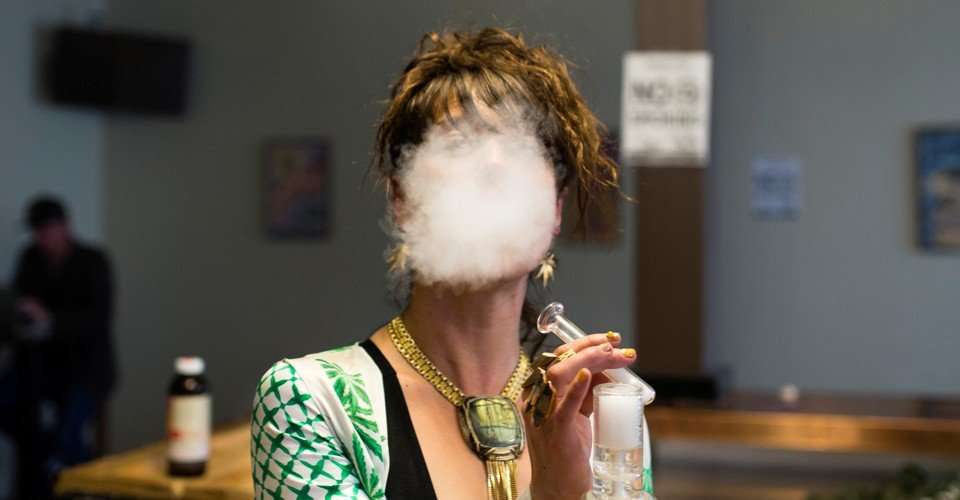The surprising effect of marijuana legalization on college students
Public-health experts worry about the increasingly potent options available, and the striking number of constant users. “Cannabis is potentially a real public-health problem,” said Mark A. R. Kleiman, a professor of public policy at New York University. “It wasn’t obvious to me 25 years ago, when 9 percent of self-reported cannabis users over the last month reported daily or near-daily use. I always was prepared to say, ‘No, it’s not a very abusable drug. Nine percent of anybody will do something stupid.’ But that number is now [something like] 40 percent.” They argue that state and local governments are setting up legal regimes without sufficient public-health protection, with some even warning that the country is replacing one form of reefer madness with another, careening from treating cannabis as if it were as dangerous as heroin to treating it as if it were as benign as kombucha.
But cannabis is not benign, even if it is relatively benign, compared with alcohol, opiates, and cigarettes, among other substances. Thousands of Americans are finding their own use problematic in a climate where pot products are getting more potent, more socially acceptable to use, and yet easier to come by, not that it was particularly hard before.
For Keith Humphreys, a professor of psychiatry and behavioral sciences at Stanford University, the most compelling evidence of the deleterious effects comes from users themselves. “In large national surveys, about one in 10 people who smoke it say they have a lot of problems. They say things like, ‘I have trouble quitting. I think a lot about quitting and I can’t do it. I smoked more than I intended to. I neglect responsibilities.’ There are plenty of people who have problems with it, in terms of things like concentration, short-term memory, and motivation,” he said. “People will say, ‘Oh, that’s just you fuddy-duddy doctors.’ Actually, no. It’s millions of people who use the drug who say that it causes problems.”
Users or former users I spoke with described lost jobs, lost marriages, lost houses, lost money, lost time. Foreclosures and divorces. Weight gain and mental-health problems. And one other thing: the problem of convincing other people that what they were experiencing was real. A few mentioned jokes about Doritos, and comments implying that the real issue was that they were lazy stoners. Others mentioned the common belief that you can be “psychologically” addicted to pot, but not “physically” or “really” addicted. The condition remains misunderstood, discounted, and strangely invisible, even as legalization and white-marketization pitches ahead.
The country is in the midst of a volte-face on marijuana. The federal government still classifies cannabis as a Schedule I drug, with no accepted medical use. (Meth and PCP, among other drugs, are Schedule II.) Politicians still argue it is a gateway to the use of things like heroin and cocaine. The country still spends billions of dollars fighting it in a bloody and futile drug war, and still arrests more people for offenses related to cannabis than it does for all violent crimes combined.

jones61 on August 20th, 2018 at 16:54 UTC »
"Anything that makes ya feel good, be careful with it“. -my cousin Danni.
Neumanium on August 20th, 2018 at 16:38 UTC »
Congratulations an article describing how pot is addictive and some people will abuse it and develop problems with it just like everything else,alcohol, opioids, the internet, video games, cars, food, books, shopping, gambling, sex. I consider pot to be addictive just like alcohol and I believe it should be legal, but regulated just like alcohol. After all we allow people to drink socially and then make poor decisions. It’s use should be restricted to adults just like alcohol.
I read a lot of the comments and decided to clarify my statement that marijuana can be addictive just like alcohol. Alcohol is physically and psychologically additive, and withdrawals from booze can kill you if not done under medical supervision. Marijuana is psychologically additive and you will have withdrawal, though it will not kill you. You will just be highly uncomfortable. But they are both additive and can be abused, which was my point. The abuse of both substances can have ill affects on your life, your social interactions, you could lose your job, depending on the state you could be arrested and thrown in jail, at the federal level you will be at a minimum arrested. That is what I meant to say.
As to those who noted that I missed tobacco, I did it was accidental. Tobacco can kill you with cancer and other diseases which are horrible. My mistake and tobacco is legal and is regulated and taxed.
buckethealien on August 20th, 2018 at 15:29 UTC »
The whole reason it was ever made illegal had nothing to do with what it will actually do if used. It also had nothing to do with public safety.